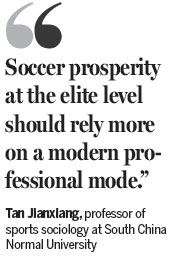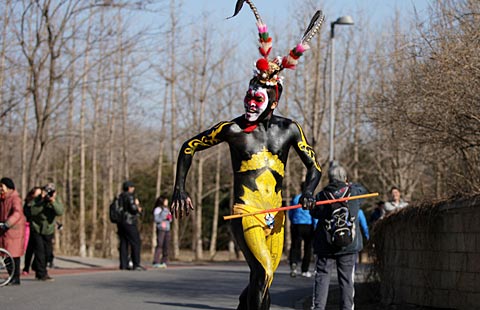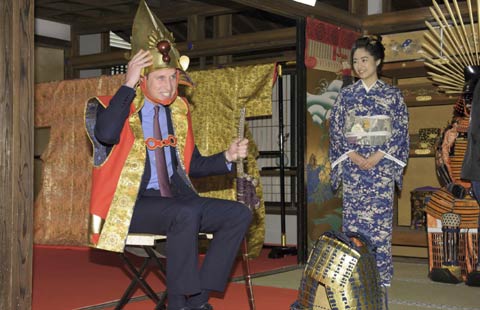Sport chiefs to press ahead with soccer reforms
Updated: 2015-03-02 07:37
By Sun Xiaochen(China Daily)
|
||||||||
The top sport body has vowed to push forward reforms of the way soccer is run while promoting mass participation in the game as the country aims to become a major participant on the world stage.
The country is shifting its focus from winning gold medals to improving mass fitness and well-being, and the less-developed status of high-profile sports such as soccer has become a pressing issue. Disappointing performances by national teams and the decline of the talent pool is causing concern among the public and the nation's leaders.
Comprehensive measures should be taken to reform the State-run management structure to allow professional leagues and the school system to prosper in a favorable environment and raise the game's profile, delegates at a symposium on sports development were told on Saturday.
"Soccer will be the pilot sport in the reform, which calls for a market-oriented approach and the separation of supervisory and management responsibilities," said Liu Peng, head of the General Administration of Sport.
The symposium was attended by delegates from 23 government departments, including the Education Ministry, the Finance Ministry and the National Development and Reform Commission. They exchanged views on sport reform and the promotion of mass fitness.
The meeting took place a day after a top policymaking team headed by President Xi Jinping approved a reform plan designed to boost soccer from schools to stadiums.
Under the plan, the Chinese Football Association will be required to hand over decision-making powers to the Chinese Super League company, which was formed by 16 club shareholders in 2005 to run the top league. The association will also provide coaching support to the Education Ministry so the campus league can be expanded.
The moves are expected to solve the problem that the association, the biggest shareholder in the CSL company, both operated and supervised the league, said experts. The centralization of power proved a breeding ground for match-fixing and bribery, they added.
Tan Jianxiang, a professor of sports sociology at South China Normal University, said: "Soccer prosperity at the elite level should rely more on a modern professional mode and operate independently. As for grassroots participation, the school system should play a more prominent role."
The success of CSL club Guangzhou Evergrande, which is owned by a real estate company and managed by an Italian team including World Cup winner Fabio Cannavaro, proves that a professional approach works. It became the first Chinese club to win the Asian Football Confederation Champions League in 2013.
However, China remains far from being a strong soccer power due to the limited level of participation by young people.
According to the CFA, 190,000 student players are registered with local sports authorities - less than a third of the number in 1995.
Adam Zhang, founder of sports marketing agency Key-Solution, said the decline is mainly due to the tarnishing of the game's reputation by match-fixing and bribery scandals in 2010.
"Sport is being recognized by more and more parents as an educational tool, not just a form of exercise, and education authorities should highlight its role on campus," he said.
sunxiaochen@chinadaily.com.cn

- Legislative, advisory assemblies clean house
- Reserves expanded to protect panda's habitats
- Sport chiefs to press ahead with soccer reforms
- Visitors enjoy cherry blossom in a park in SW China's Yunnan
- Death toll rises to 9 in Shenzhen airport car accident
- Reporters receive accreditation for 'two sessions'
- Japan has to reflect on history: former PM
- Prince William played with kids on Japan tsunami trip
- Homeland Security funding drama darkens US fiscal outlook
- African wildlife agency lauds China's ban on ivory imports
- China ends UN council presidency, eyeing 70th birthday
- Russian opposition leader Nemtsov shot dead in Moscow

 Monkey king, angel and superwoman at Beijing's 'naked run' race
Monkey king, angel and superwoman at Beijing's 'naked run' race
 Red-crowned cranes in Yancheng
Red-crowned cranes in Yancheng
 Prince William evokes Diana memories on Japan tsunami trip
Prince William evokes Diana memories on Japan tsunami trip
 Best times to view spring flowers in Beijing
Best times to view spring flowers in Beijing
 Dragon boat race to celebrate Chinese New Year in Sydney
Dragon boat race to celebrate Chinese New Year in Sydney
 South Pole setting for wedding photos, penguins included
South Pole setting for wedding photos, penguins included
 Milan Fashion Week - Autumn/Winter 2015-16
Milan Fashion Week - Autumn/Winter 2015-16
 Russian opposition leader Nemtsov shot dead in Moscow
Russian opposition leader Nemtsov shot dead in Moscow
Most Viewed
Editor's Picks

|

|

|

|

|

|
Today's Top News
Homeland Security funding drama darkens US fiscal outlook
17th Apple retail store in Chinese mainland opens in Shenyang
PBOC cuts rates to ease business financing
Former celebrity TV anchor on crusade against pollution
China ends UN council presidency
Ling Jihua removed from CPPCC leadership list
Tech firms cut from approval list
Yuan on move, but not to top
US Weekly

|

|







